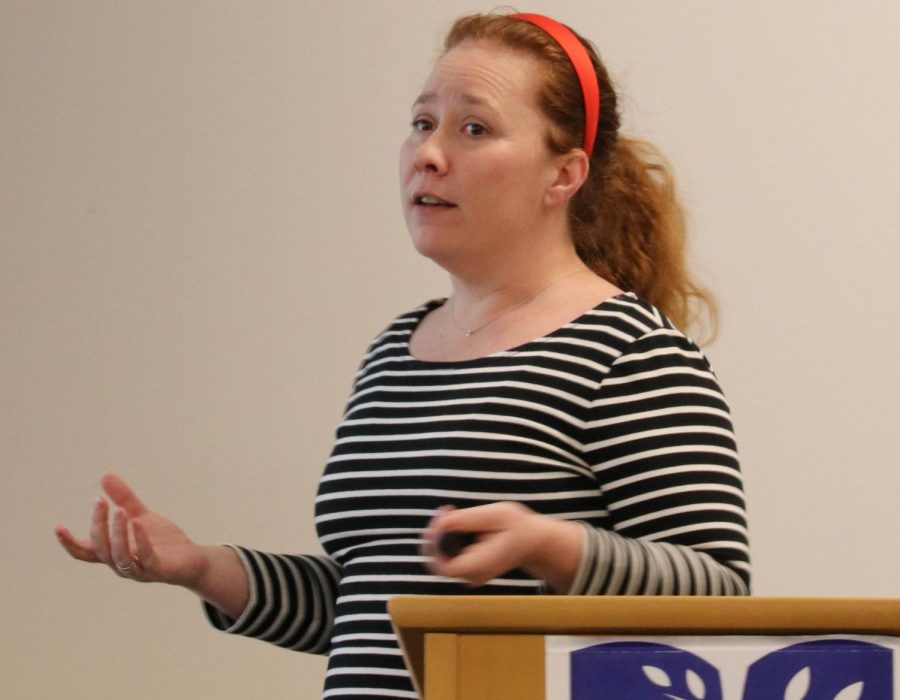SWAG Forum talks women in politics
Assistant professor of political science Dr. Jayme Renfro discussed the obstacles and double standards faced by female political candidates in the latest SWAG Forum.
Mar 5, 2020
On Monday, March 2 at 12 p.m. in the Rod Library ScholarSpace, UNI Women and Gender Studies (WGS) presented a SWAG Forum titled “Jackie and Jill Robinson: Women and the Need to be Better at Politics.”
The lecture was led by Dr. Jayme Renfro, assistant professor of political science. Dr. Wendy Hoofnagle, director of WGS, introduced Renfro and announced this talk as a kickoff for Women’s History Month 2020.
Renfro began by saying that the lecture would concern “women and the perception that they need to be better than their male counterparts.” She said there does appear to be a significant difference in the way female political candidates are scrutinized in comparison to male candidates, especially regarding appearance and the sound of one’s voice.
Comments on news articles about female candidates and political leaders “will make your soul hurt,” Renfro said, “[because] there is a certain brand, certain flavor, of criticism that female candidates tend to get that we don’t really do for men.”
However, Renfro said that there is not a lot in the scientific literature that supports gender as a major factor when it comes to voters making the decision in the booths. While it was once true in the 1960s and 1970s that voting decisions were more likely to be gender-based, it was always by a small margin. Since the 1980s (excluding presidential elections), female candidates have been getting the same level of support as male candidates with similar characteristics.
However, this does not mean that women have the same chance of winning, according to Renfro. She drew a comparison to Jackie Robinson, who was not only a great baseball player, but was also media-friendly and well-spoken.
“He had to be all of the things and then some, otherwise they wouldn’t have hired him,” Renfro said. “If he had been just as good as the rest of the players, he wouldn’t have gotten a job.”
Renfro believes this is what is happening to women in the political arena, and that women do not run for office at the same rate as men because they do not feel qualified. This is due to the standard that the public holds women to, although it is unclear whether this is a gender issue or the issue of being the first of something, an idea Renfro referred to as “The Hillary Standard.”
“When women [are] on the same ballot as men, [they] tend to then be more qualified than them, to have that equal chance of being elected,” she said. “You’ve got to be the Jackie Robinson of politics to put yourself out there.”
Renfro also mentioned the issue of scandals, and that a scandal often stalls and may even ruin a woman’s political career in a way that it will not for men. Renfro said that although she thinks about running for school board, she worries about things in her past, “illustrating that [her] perception of the impact of scandals on [her] qualifications to run for office” are very strong and very real.
However, Renfro said that when women do win elections, evidence has shown that they do a better job. She said women are far more constituent-orientated than male politicians. They send 17% more mail to their district, have more home state-based staff and deliver 20-100% more government spending to their districts than men. They vote closer in line to their constituents’ interests and values, are more likely to take on committee assignments relevant to their districts and introduce more bills related to policy issues that are important to their constituents.
Overall, Renfro believes that truly fixing the political climate for women must start with the erasure of the systemic barriers, such as lack of childcare, that are still working to keep women out of the arena they want to join.
Second year master’s student of social psychology Matt Sedlacek liked that the lecture was both general and broad.
“It covered all aspects of perceptions of women in politics. I think it’s important to touch on not only perceptions but also reality […] It shows how deeply rooted these issues are,” he said, “It’s almost a map of where we need to go.”
Another second year master’s student of social psychology, Evan Stilgenbaur, felt the lecture went beyond just politics.
“It’s truly a systemic problem and gender really does matter […] Women really do perceive that they are worse. I think it’s a very real issue, and I don’t know how to tackle that. Certainly, more research needs to be done,” he said.
Second year master’s students of women and gender studies Sara Naughton and Shareece Burrell appreciated the lecture’s timeliness and its point of view regarding politics and media coverage.
“The election is getting heated and it’s disappointing to see the way women candidates are being treated,” Naughton said.
Burrell added, “I work with the basketball team and it’s a huge deal universally that women don’t get the same media coverage.”
Ahlam Laluar, a second year master’s student of women and gender studies, does not know much of American politics, but she is hoping to see a solution to the problems in this country.
“We list all these problems and issues but now what? What is the solution? That’s what I want to know,” she said.








